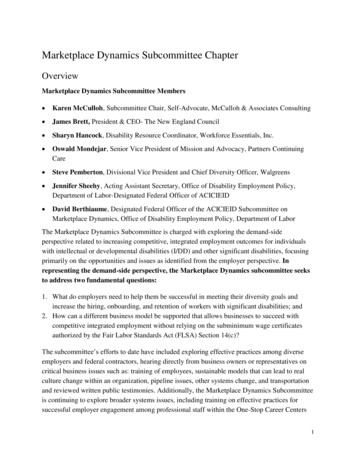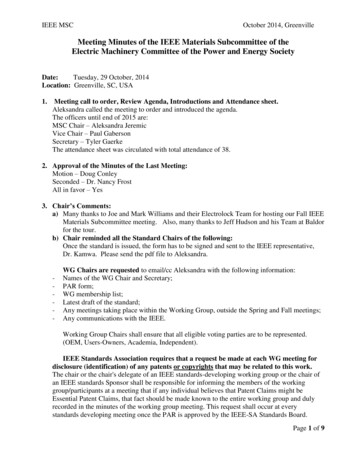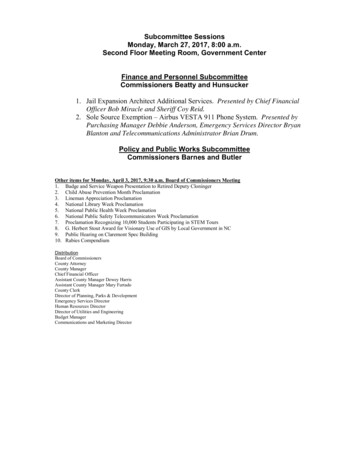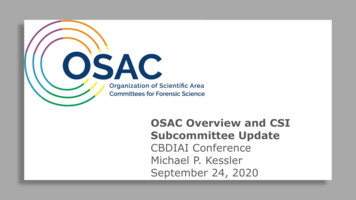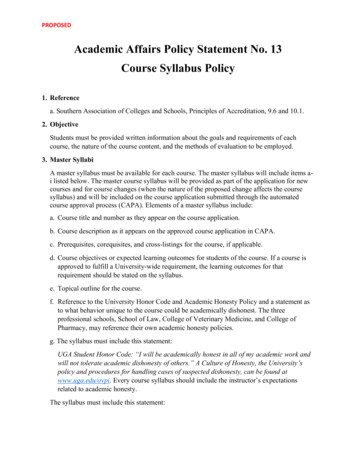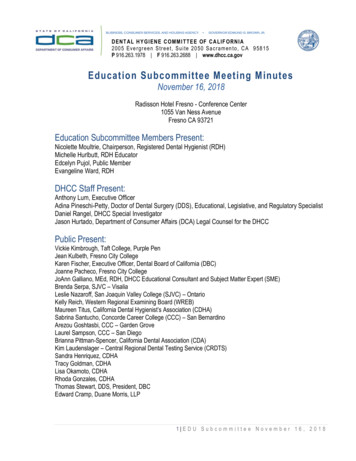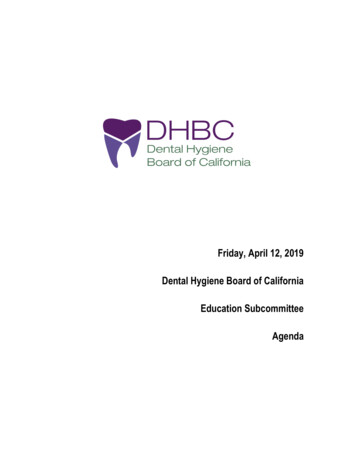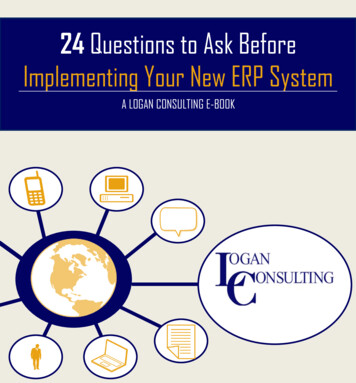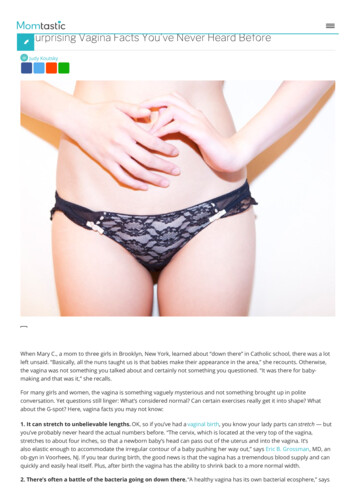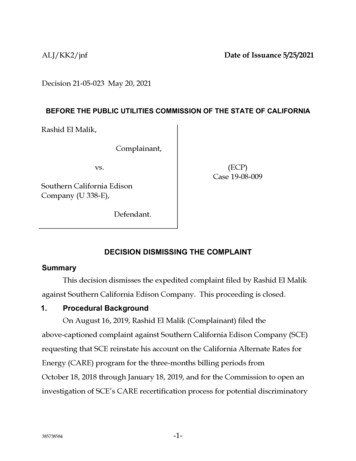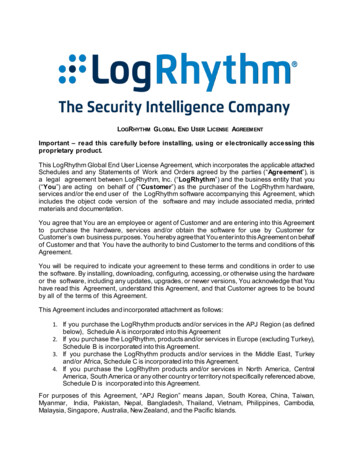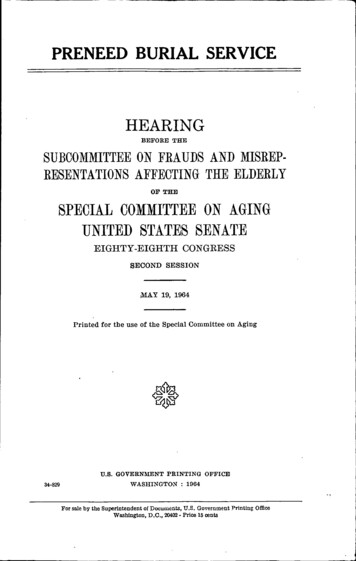
Transcription
PRENEED BURIAL SERVICEHEARINGBEFORE THESUBCOMMITTEE ON FRAUDS AND MISREPRESENTATIONS AFFECTING THE ELDERLYOFTHESPECIAL COMMITTEE ON AGINGUNITED STATES SENATEEIGHTY-EIGHTH CONGRESSSECOND SESSION,MAY 19, 1964Printed for the use of the Special Committee on Aging0PU.S. GOVERNMENT PRINTING OFFICE34-829WASHINGTON: 1964For sale by the Superintendent of Documents, U.S. Government Printing OfficeWashington, D.C., 20402- Price 15 cents
SPECIAL COMMITTEE ON AGINGGEORGE A. SMATHERS, Florida, ChairmanPAT McNAMARA, MichiganEVERETT McKINLEY DIRKSEN, IllinoisCLAIR ENGLE, CaliforniaBARRY GOLDWATER, ArizonaHARRISON A. WILLIAMS, JR., New Jersey FRANK CARLSON, KansasMAURINE B. NEUBERGER, OregonWINSTON L. PROUTY, VermontWAYNE MORSE, OregonKENNETH B. KEATING, New YorkALAN BIBLE, NevadaHIRAM L. FONG, HawaiiFRANK CHURCH, IdahoE. L. MECHEM, New MexicoJENNINGS RANDOLPH, West VirginiaEDMUND S. MUSKIE, MaineEDWARD V. LONG, MissouriFRANK E. MOSS, UtahEDWARD M. KENNEDY, MassachusettsRALPH W. YARBOROUGH, TexasJ. WILLIAM NORMAN, Jr., Staff DirectorJOHN GuY MILLER, Minority Staff DirectorSuRCOMmITTEEON FRAuDS AND MISREPRESENTATIONs AFFECTING THE ELDERLYHARRISON A. WILLIAMS, JR., New Jersey, ChairmanMAURINE B. NEUBERGER, OregonKENNETH B. KEATING, New YorkWAYNE MORSE, OregonWINSTON L. PROUTY, VermontFRANK CHURCH, IdahoHIRAM L. FONG, HawaiiEDMUND S. MUSKIE, MaineE. L. MECHEM, New MexicoEDWARD V. LONG, MissouriEDWARD M. K-ENNEDY, MassachusettsRALPH W. YARBOROUGH, TexasWILLIAM E. ORIOL, Professional Staff MemberGERALD P. NYE, Minority Professional Staff MemberII
CONTENTSCHRONOLOGICAL LIST OF WITNESSESQpening statement of the chairman - - 1oRichard N. Carpenter, Special Assistant Attorney General, New Mexico,and W. Dan Bell, manager, Rocky Mountain Better Business Bureau,Denver, Colo AtSTATEMENTSNational Better Business Bureau, Inc., Allan E. Bachman, executive vice,ofresident, letter and statement /,,-Raether, Howard C., executive secretary, National Funeral Directors'Association of the United States, Inc., Milwaukee, Wis -ADDITIONAL INFORMATIONCalled Untrue," newspoperarticles from RockyTestimonyPlan"BurialMountain News, Denver, Colo ------------National Selected Morticians, W. M. Krieger, managing director, letterdated June 3, 1964, to Senator Williams -20MnPage1,12211727
PRENEED BURIAL SERVICETUESDAY,lAY 19, 1964U.S. SENATE,Suscommi rrEE ON FRAUDSMISREPRESENTATIONSOFAFFECTING THEIANDELDERLY,THE SPECIAL COMMITTEE ON AGING,Washington, D.C.The subcommittee met at 2:10 p.m., in room 4200, new Senate OfficeBuilding, Senator Williams (chairman of the subcommittee)presiding.Present: Senator Williams.Staff members present: William E. Oriol, professional staff member; Gerald P. Nye, minority professional staff member; PatriciaSlinkard, chief clerk; Mary Keeley, staff assistant; Marion Keevers,minority chief clerk.Senator WILLIAs. Today we are fortunate to have with us two witnesses with firsthand knowledge of mail-order preneed burial insuranceplans. The subcommittee has just begun its studies in this area, andwe know that we still have much to learn about the overall situation.During staff visits to two States, however, we learned enough towarrant our concern, so we have asked these two witnesses to beginour inquiry today with their statements.First, we will hear from Mr. Richard N. Carpenter, special assistantattorney general of the State of New Mexico. We have certainly drawnhighly on New Mexico today.And, of course, we have a return visitor, Mr. W. Dan Bell.Gentlemen, we are looking forward to this. This area has been anew one to me, so I will learn something about it.STATEMENTS OF RICHARD N. CARPENTER, SPECIAL ASSISTANTATTORNEY GENERAL OF THE STATE OF NEW MEXICO, AND W.DAN BELL, MANAGER, ROCKY MOUNTAIN BETTER BUSINESSBUREAU, DENVER, COLO.Air. CARPENTER. Senator, we do have independent testimony, and wehave not discussed this matter together, and Mr. Bell and I havethought it best if I proceed with my statement first.You requested the attorney general of the State of New Mexicoto present a discussion concerning these preneed burial plans, insofaras the frauds and misrepresentations in connection therewith affect theelderly.The law enforcement officials in our State have been concerned withinvestigating into the affairs of, and prosecuting abuses of and il1
2PRENEED BURIAL SERVICElegal conduct in connection with, this subject for the past several years.In the past several months the New Mexico Superintendent of Insurance, the office of the attorney general, and the State board of embalmers and funeral directors have joined together and expendedseveral hundred man-hours and thousands of dollars in pursuing thispertinent and sometimes emotional subject, and the effects it has uponthe elderly.The testimony I am about to give is based upon the findings ofthe above three agencies. Assistant Attorney General James E. Snead,who has directed the coordinated quest, should be your witness, butin his absence I shall testify as special assistant attorney general,though I am privately employed. I shall attempt to summarize theprincipal conclusions of our current efforts.Basically, "preneed" or "prearranged" plans are promotional contracts providing for the furnishing of funeral services or for thefurnishing of funeral merchandise, such as caskets or vaults, with orwithout accompanying funeral services, which service and/or personalproperty are not immediately required, but, in the usual course of business and in the contemplation of the average purchaser, are to be performed or delivered, as the case may be, subsequent to and contingentupon the death of the person for whose benefit the preneed or prearrangement plan is made.Such plans are usually called preneed because they involve thepaying by the purchaser, often on the installment basis, of sums ofmoney, often several hundred dollars for each elderly couple,years or months, or hopefully, decades in advance of death, the timeof "need."Senator WILLAMrs. Hopefully. from the same man's standpoint?Mr. CARPENTER. Well, hopefully, also, from the purchaser's standpoint.Senator WILLIAMS. I see. I missed that.Mr. CARPENTER. The acute and pressing problem is the dispositiono liese funds prior to the time of need.two-thirds of our sister States have statutes authorizingpreneed plans under stipulated conditions. Most of these States require that 100 percent of payments made in advance of need be placedin State supervised trust funds.The State of New Mexico enacted legislation in 1957 to attempt toprotect the purchasing public by declaring preneed plans to be thetransaction of insurance business and requiring that they be regulatedby our superintendent of insurance for the protection of the publicin the same manner as the business of life insurance; the State boardof embalmers and funeral directors followed the same approach byregulation. * Now there are many cases in the common law holding that the furnishing of funeral merchandise and funeral services are funeral insurance, so what New Mexico sought to do is to codify the commonlaw, by enacting the statute.Many other States regulate it by 100 or 75 percent trust fund.It is readily apparent that preneed plans are of the nature of insurance, and many judicial decisions so hold.As we view the difficulties and examine nationwide literature onthe subject of funeral service, we believe that the principal object of
PRENEED BURIAL SERVICE3public criticism, and the real subject of Miss Mitford's book, arepromotive entrepreneurs from outside the funeral profession and, inour State, for the most part from without New Mexico, who prey upon,or seek advantage from, elderly persons seeking security concerningthleir last rites on this eaftb.A 1963 pamphlet by the Association of Better Business Bureausentitled, "The Prearrangement and Prefinancing of Funerals," aptlydescribes the situation:In recent years a growing number of individuals, firms, and groups havesought to stimulate public interest in prearranged, prefinanced funeral plans.Among them have been sales organizations and promoters outside the funeralprofession who seek to interpose themselves as third parties in the traditionalpersonal and confidential relationship between the funeral director and thesurvivors of the deceased.Grievous disappointments and severe financial losses have resulted from someunsound promotional schemes, foisted on a credulous public by armies of highpressure salesmen. There are dangers in any plan for prepaying funeral expense unless it is surrounded with proper safeguards.The Supreme Court of Illinois has stated:In the long Interval between full receipt of the purchase price and contractperformance, the opportunities for fraud are great and risk of insolvency, withconsequent inability to perform, apparent.These dire predictions have, unfortunately, often become factiNew Mexico. The sales are in the hundreds of thousands of dollarsand contract purchasers are at the mercy of the selling groups to perform at a time of grief. NQZ20f the nonprofessional gous sellingureneed in ourAStatebnv erane srtion, dtspnte vigorous attempts by our superintendent ofilnsumandi office of thatorne geealtcfmehJ/ sTerf-sliers of these preneed plans use the type of hard-sell tacticsso vividly shown in recent issues of national magazines. Our Stateis very much concerned that these vendors, usually based outside ofNew Mexico's territorial jurisdiction, have sole, unregulated controlof vast sums of our citizens' money.Now as to the facts as developed through our investigations andadministrative and court hearings:In terms of volume, the largest vendor of these preneed plans is aDenver, Colo., based group operating under the corporate name ofConsolidated Industries, Inc., and which is headed by a gentlemannamed Dallas J. Dhority. This vending organization purchased twofuneral establishments in New Mexico-Our Chapel of Memories inClovis and Roberts Funeral Home in Hobbs and operates in NewMexico through a myriad of corporate entities.It foists upon the public in our eastside region adjoining Texaspreneed plans under the names of "Our Chapel of Memories-Praying Hands Division," "Order of Praying Hands," and "Lawn HavenMemorial Gardens."Senator WmLuIAms. Wait a minute. I missed that. Is that inthe statement?Mr. CARPENTER. That is on page 3, Senator.The sales are made door to door and are upon the installment basis.The purchaser signs a promissory note, is given a packet of IBMcards and envelopes and is requested to mail his payment directlyto Consolidated Industries in Denver.
4PRENEED BURIAL SERVICEOnce the funds leave New Mexico, our authorities can offer onlyminimum protection and we have no concrete knowledge of how thefunds are disposed of once they leave our territorial limits. Preliminary investigation has uncovered only minimal assets in New Mexico,under whatever corporate names this group, deigns to use at a givenmoment.No matter what corporate name is used upon the written contractual instruments, the term "escrow plan" usually accompanies the"sales pitch." Preliminary investigation has uncovered a bank account with a small deposit which was entitled an "escrow account"but which was, in truth and in fact, a mere savings account underthe signature of Mr. Dhority and an associate.This group's written contracts purport only to furnish caskets.The contracts' total purchase price has usually been 637.50 per plan,/w ior what professional statistics show is approximately the regional,, \verage for complete funeral services, including the casket.Evidence introduced in a trial on this matter tended to show thatpurchasers believed that these so-called "casket" contracts includedcomplete funeral services, and it is no wonder that some purchasersbelieved the contracts provided for the furnishing of services inaddition to the casket, in view of the customary practice of funeraldirectors to quote only an integrated price for both the casket andaccompanying professional services, which price is usually displayedupon the casket.In October 1961, after numerous complaints and inquiries frompurchasers of these preneed plans, the superintendent of insuranceinstituted injunctive proceedings against further sales until ourstatutoresuirements were int aesd to require an accountin ofE/sall previous such insurance business.The following month, a consent decree was entered by which thedefendants-Mr. Dhority and his local corporate entitees and employees-were required to render an accounting and were enjoinedYfrom certain acts in connection with such preneed funeral matters.In September 1962, our attorney general, at the insistence of theK superintendent of insurance, instituted contempt proceedings foranl violation of the consent decrees by a continued sales program basedupon outright and unequivocal violation of New Mexico law.Mr. Dhority, the president of Consolidated, Consolidated Industries, Inc., Our Chapel of Memories, and two New Mexico employeesof the sales organization were adjudged in contempt and given partially suspended fines and suspended jail sentences.On April 6 of this year, the Supreme Court of New Mexico affirmedthe contempt judgment. State officials now will attempt to coerceompliance by enforcing the terms for suspension of part of the finesand jail sentences.But, Senator, unfortunately, even this action has not begotten compliance. The Denver-based group continues to operate from its outof-State base, in conflict with the statutes and public policy of theJIState of New Mexico and contrary to the best interests of the invest-ing public.Before leaving this foreign vending organization, let us relatewhat its president and chief stockholder, Mr. Dhority, testified was
PRENEED BURIAL SERVICE5the cost of the casket delivered-hopefully, again-under their prayinIhands escrow division contract: 96.50.Oven if our elderly citizens believed they purchased merely casketsand not professional services, we were astounded at the margin ofprofit claimed by the vending group at the expense of elderly cosumers, many of whom are on limited retirement incomes.The second group operates from El Paso, Tex. Until the approximate time New Mexico authorities became interested in this group'sactivities, it sold funeral services, presumably including the casket,under the name of Memorial Trust Corp. of New Mexico.It presently exists under the name of Memorial Management Association, Inc. The records of our corporation commission indicate thatthis group is headed by Mr. Norman Anderson of El Paso, Tex. Under its new name, the so-called Anderson group openly advertisedin newspapers in Carlsbad, Clovis, and Tucumcari that it is selling complete funeral services, claiming that its instruments will behonored throughout the United States and Canada.As far as weknow, the funds collected under these contracts are transported toTexas and kept without our jurisdiction. There are no substantial,or even insubstantial, assets left within our control. ,One of the several affidavits on file may illustrate tochicommittee how this preneed operation served the public. On or aboutNovember 28, 1962, a Carlsbad married couple, with one adult son, land the husband working for the Potash Mines Transportation Co.,was approached by a salesman for the Memorial Management Association and was told by the salesman that the funeral service agreementwas good anyplace in the United States and Canada.The family entered into two contracts for 1,324 each, payable 29monthly upon the express representation that the services coveredcould be erformed by the funeral home of this family's choice.After becoming suspicious 6 months later, the family inquiredwhether the benefits would be available at the funeral establishment oftheir preference, but, after they had already paid in 145 on the twocontracts, were told by a representative of the Memorial ManagementAssociation that another funeral home, not of their choice, would beused at contract price and asked if it would be worth 400 or 500 morefor the family to use the establishment of their choice. This conductresulted despite the express contrary representation of newspaper advertising and of the salesman.In truth and in fact, at the time the contracts were sold, the Anderson group had contracts with only three New Mexico funeral homes tofurnish services, and these contracts have since been terminated.Again, the personal story is rooted in the misrepresentation andfraud perpetrated upon real life citizens of New Mexico in the coursesof making the sale. But the larger picture must include the queryof where all the moneys collected under these contracts have gone.Our State authorities do not know and our worries should become those-of all the citizenry and of this subcommittee.A?i,t--The third large vending group was again actively operated by nonfuneral service practitioners. This group operated in Roswell,N. Mex., under two corporate names-the Mason Funeral Home, Inc.,and Memorial Foundation, Inc. The outfit was headed by a gentleman by the name of H. K. Holland, who, incidentally, when charged34-829-642'A
6PRENEEDBURIAL SERVICEwith fraudulently obtaining licenses from the State board of embalmers and funeral directors, surrendered the same for cancellation,later invoking his constitutional privilege to refuse to testify whenasked at an administrative hearing about the alleged fraud.February 1964, the New Mexico State Board of Embalmersand Funeral Directors held 3 days of hearings in Roswell. TheseRoswell hearings emphasized the precarious position of holders ofpreneed contracts not complying with New Mexico law.In the case of Memorial Foundation, Inc., the evidence shows thatpurchasers had paid in by early February of this year, on the installment basis, 32,923.40 and the testimony demonstrated that not onesingle cent had been deposited in any escrow or trust account withthe local banking institution which purchasers testified was to be thedepository of certain of the moneys collected under these preneedcontracts.In fact, the evidence showed that Memorial Foundation, the corporate entity itself, actually owed money to its president and controlling stockholder, the same H. K. Holland. The hearing recordalso shows that the sum of 800 only had been deposited in the formof certificates of deposit by the Mason Funeral Home and that, asof last February, these funds earned a total of 32 interest, whenthe corporation had collected in excess of 18,000.Both corporations sold preneed contracts and the total face valueweas in exce,These were promoted in the southeasternI)portion of outsL' The State board of embalmers and funeral directors revoked thelicenses of its two licensees involved. The State board, after the3-day hearing, found that these organizations had participated in aplan whereby the public was defrauded and had used misleading andinaccurate advertising. It found that both corporations had soldpreneed and that the unsound promotional scheme was foisted on acredulous public by a virtual army of high-pressure salesmen, wasillegal, and was accompanied by numerous misrepresentations andfrauds.Basically, there were two separate plans. The first was carriedforth under one name, until local law enforcement officials becameaware of that name. Thereafter, the plan was sold under a differentcorporate name. The first plan was sold under the name of theMason Funeral Home Corp., and obtained 119 contract purchasers.As in the first group's contract, the written contract was limitedto the furnishing of caskets only and the total purchase price- 625"mysteriously" approximated the regional average for full funeralservices, including the casket. The caskets, incidentally, cost thecorporation 167.50. A few examples of this promotion may behelpful.Representation: The manager for the Mason Funeral Home Corp.,H. K. Holland, testified that there was in reserve in an escrow accountfunds sufficient to pay for caskets to b
Slinkard, chief clerk; Mary Keeley, staff assistant; Marion Keevers, minority chief clerk. Senator WILLIAs. Today we are fortunate to have with us two wit-nesses with firsthand knowledge of mail-order preneed burial insurance plans. The
